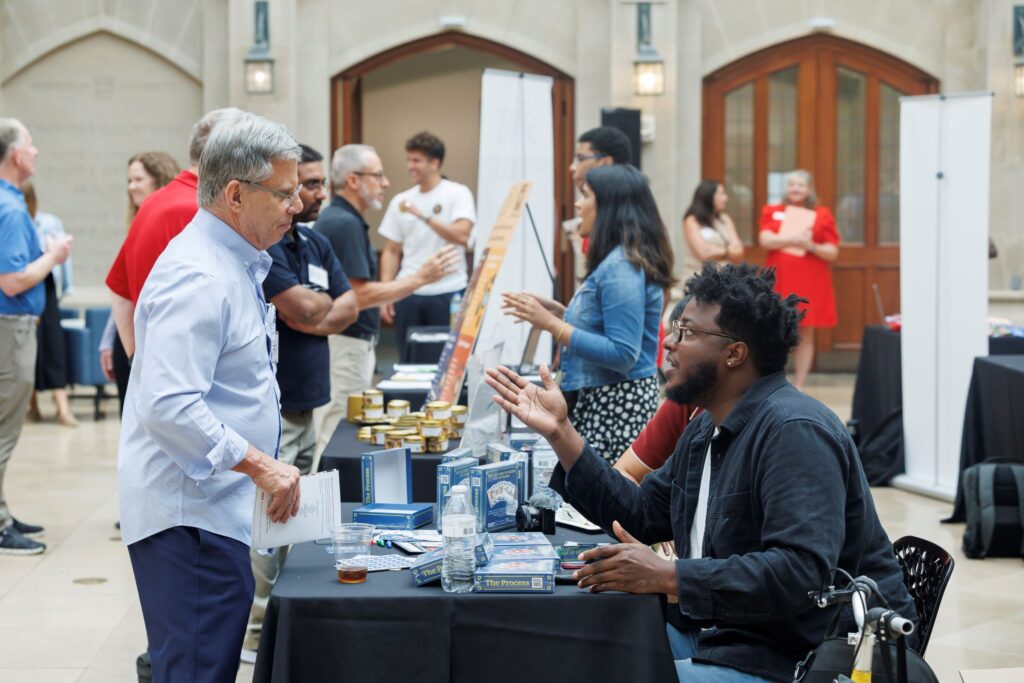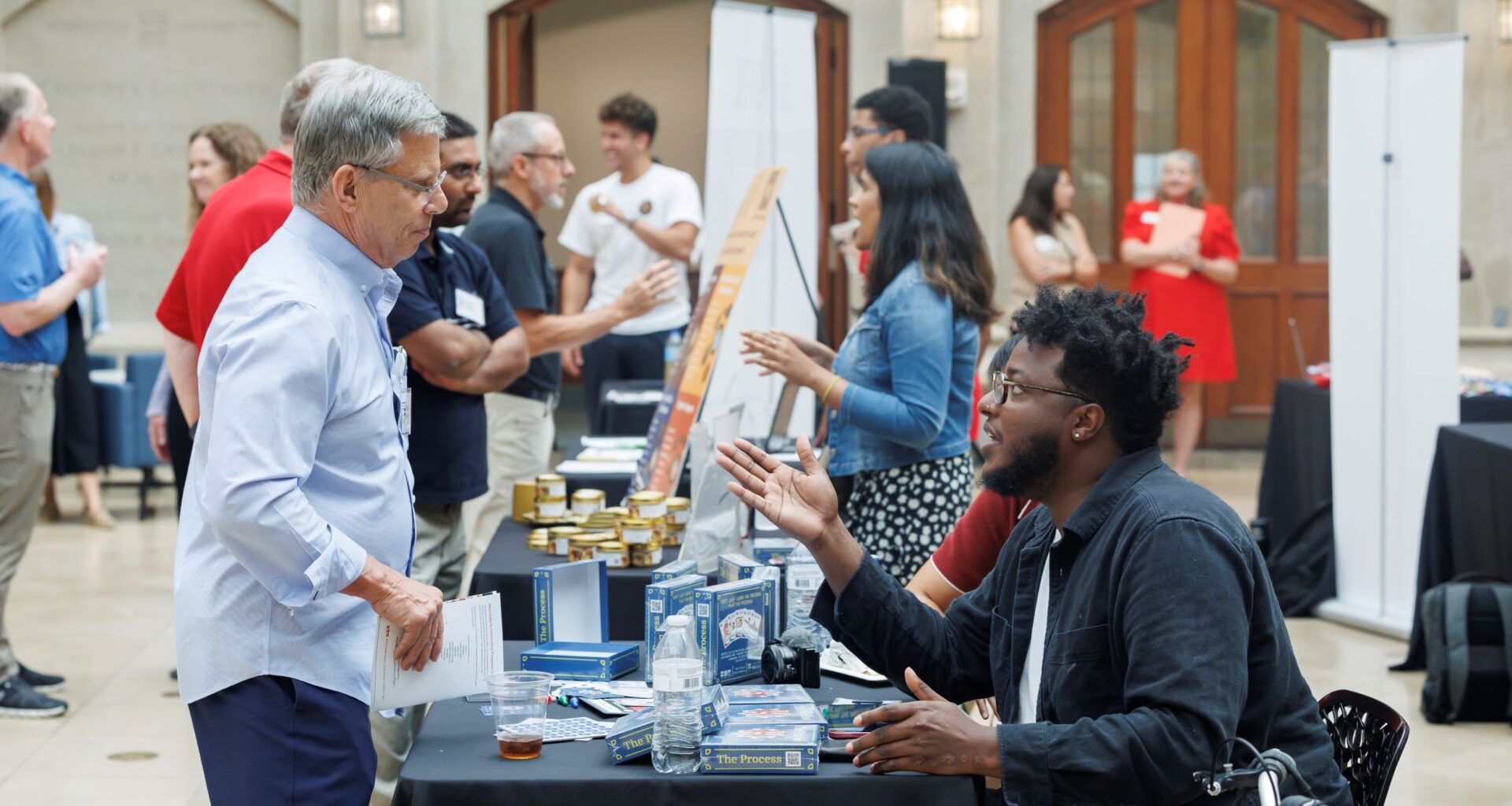
Student founders show off their ventures at the 2025 Skandalaris Launchpad Expo at Washington University in St. Louis. Photo by Rebecca Clark
If you want to understand the entrepreneurial ethos as defined by Olin Business School at Washington University in St. Louis, follow Block Club’s journey to market.
It started when Franklin Taylor, WashU Olin MBA 2024, noticed how many groceries he was wasting from taking advantage of the free food he was offered as a student. He thought dynamic pricing could persuade customers to buy what they’d actually eat, cutting food waste while also helping small grocers stay profitable and connected to their local customers..
He quickly learned that small stores just didn’t have the data to support such a platform. So, he pivoted.
He founded Block Club (formerly Zaiko), a platform connecting locals to neighborhood stores through curated offers. It helped grocers reach nearby customers most likely to become loyal regulars, all with zero upfront cost. As the idea gained traction, Taylor expanded to other small businesses in downtown St. Louis, partnering with apartment communities to drive traffic.
Franklin Taylor, MBA ’24
So far, the company has partnered with 23 apartments and hotels to connect 7,000 potential customers with more than 15 neighborhood businesses. The goal for the next year is to reach 100 buildings and 100 businesses, building a citywide platform for St. Louis residents to discover the hidden gems around the corner.
It can be argued that Block Club’s journey reflects the founders’ mindset of Washington University in St. Louis generally and Olin specifically: Learn by doing, build within a community, and look for ways to innovate – both in existing companies and in new ventures.
“One of my favorite things about Franklin is he’s pivoted his business a couple of times, which I think is a sign of a good entrepreneur,” says Doug Villhard, Olin’s academic director of entrepreneurship and an entrepreneurship professor in practice.
“If things aren’t working, he’s willing to change. That’s really what this entrepreneurial mindset is about.”
This mindset is just one factor helping WashU Olin’ rise to the top of our annual ranking of the World’s Best MBA Programs For Entrepreneurship year after year. 2026 is no different.
OLIN RECLAIMS CROWN IN MBA ENTREPRENEURSHIP RANKING
After slipping two spots to No. 3 last year – and ending a five-year streak at the very top – Olin has regained the crown our MBA entrepreneurship ranking for 2026.
Olin’s fulltime MBA program finished with a raw score of 69.1 (out of a possible 100), edging out last year’s winner, EDHEC Business School of France, which finished with a score of 62.6. Another European school, IE Business School in Spain, rose one spot to No. 3 with a score of 54.3.
TOP 10 ENTREPRENEURSHIP PROGRAMS FOR MBAs
Less than 3 points separated Nos. 4 to 6. Johnson Cornell Tech MBA rose an impressive 10 points this year to No. 4 with a score of 47.3. Spain’s Esade Business School was a close No. 5 with a score of 45.6 while University of Michigan Ross School of Business finished at No. 6 with 44.3.
Along with Cornell, two other schools had MBA programs rise into the top 10 after just missing the milestone last year: Rice University’s Jones School of Business rose five spots to No. 7 and Babson College rose three spots to No. 10.
Olin’s return to the top comes despite significant methodological changes we made to this year’s ranking. The result is a leaner ranking we think better measures entrepreneurial resources for full-time MBA students.
THREE INTERNATIONAL MBA PROGRAMS RANKED FOR FIRST TIME
International business schools have climbed sharply in recent years, reflecting a growing global appetite for MBA programs that teach students to build and innovate, not just manage. The 2026 ranking features nine international schools (three in the top five) compared to six in 2025 (four in the top 10) and five in 2024.
This year’s list features three international MBA programs ranked by P&Q for the first time: Woxsen University in Hyderabad, India, debuted at No. 11, China Europe International Business School (CEIBS) debuted at No. 13, and Western University’s Ivey Business School in Ontario, Canada, finished at No. 26.
According to data provided for our 2026 ranking, Woxsen was propelled to the highest debut rank with strong showings in both percentage of MBAs starting a venture or joining a startup within three months of graduation, reporting 12.9% and 15.6% respectively.
At CEIBS, known for pairing every MBA student with a senior alumni executive mentor, 72% of its MBAs participate in an entrepreneurship club – the second highest percentage for the metric.
And Ivey’s one-year MBA program finished in the top 10 for the percent of its MBA class (84%) taking an elective focused entirely on entrepreneurship.
You can see how each school ranked in our 10 individual metrics in our data dump story here.
A LEANER MORE RELEVANT ENTREPRENEURSHIP RANKING
For 2026, Poets&Quants made significant changes to our ranking methodology. We evaluated each question and metric to create a more streamlined methodology that, we think, drills down on what matters most: Are students starting companies? Are they engaging with mentors or joining startups after graduation? Are schools providing the ecosystem and support to turn ideas into ventures?
We reduced the number of metrics from 16 to 10 while changing the weights for several of the metrics we kept. You can compare last year’s metrics and weights with this year’s in our full methodology story here.
While these changes have led to some ranking swings among schools from last year’s list, we hope it is a stronger representation of the entrepreneurship resources and networks available to MBAs.
P&Q previously ranked about 10 schools that did not submit data directly to us. We collected what we could from public websites and other reporting, but these schools were given no points where no reliable data could be found.
That led to rankings where entrepreneurship powerhouses like Stanford University’s Graduate School of Business ranked in the teens and Harvard Business School struggled to crack the top 10. For the last two years, we only rank schools that submit their data to us through our institutional survey. While we continue to invite the startup powerhouses, they have so far declined to fill our data survey.
These are generally the large, prestigious programs in the M7 who have a lot of entrepreneurship resources – and a lot of students. Certainly, if you have the background, stats, and personal story to get into Stanford, you’re going to have access to one of the best entrepreneurial ecosystems in the world. It’s why Stanford GBS consistently has the most MBAs on our annual list of the top funded MBA startups.
You’re also going to be among hundreds of other superstars all vying for the same attention.
Our methodology is designed to measure how resources are allocated to individual students. We use percentages and ratios – based on the number of full-time MBA graduates from a given year – to get a sense of what entrepreneurial resources and experiences are like on a per-MBA basis. This tends to favor schools with smaller class sizes where an entrepreneurial dollar or a mentor’s time is more concentrated.
The 32 schools on this ranking are entrepreneurial gems, even as their MBA programs may not typically get as much ink as the most prestigious.
NEXT PAGE: WashU Olin’s winning formula
© Copyright 2025 Poets & Quants. All rights reserved. This article may not be republished, rewritten or otherwise distributed without written permission. To reprint or license this article or any content from Poets & Quants, please submit your request HERE.


